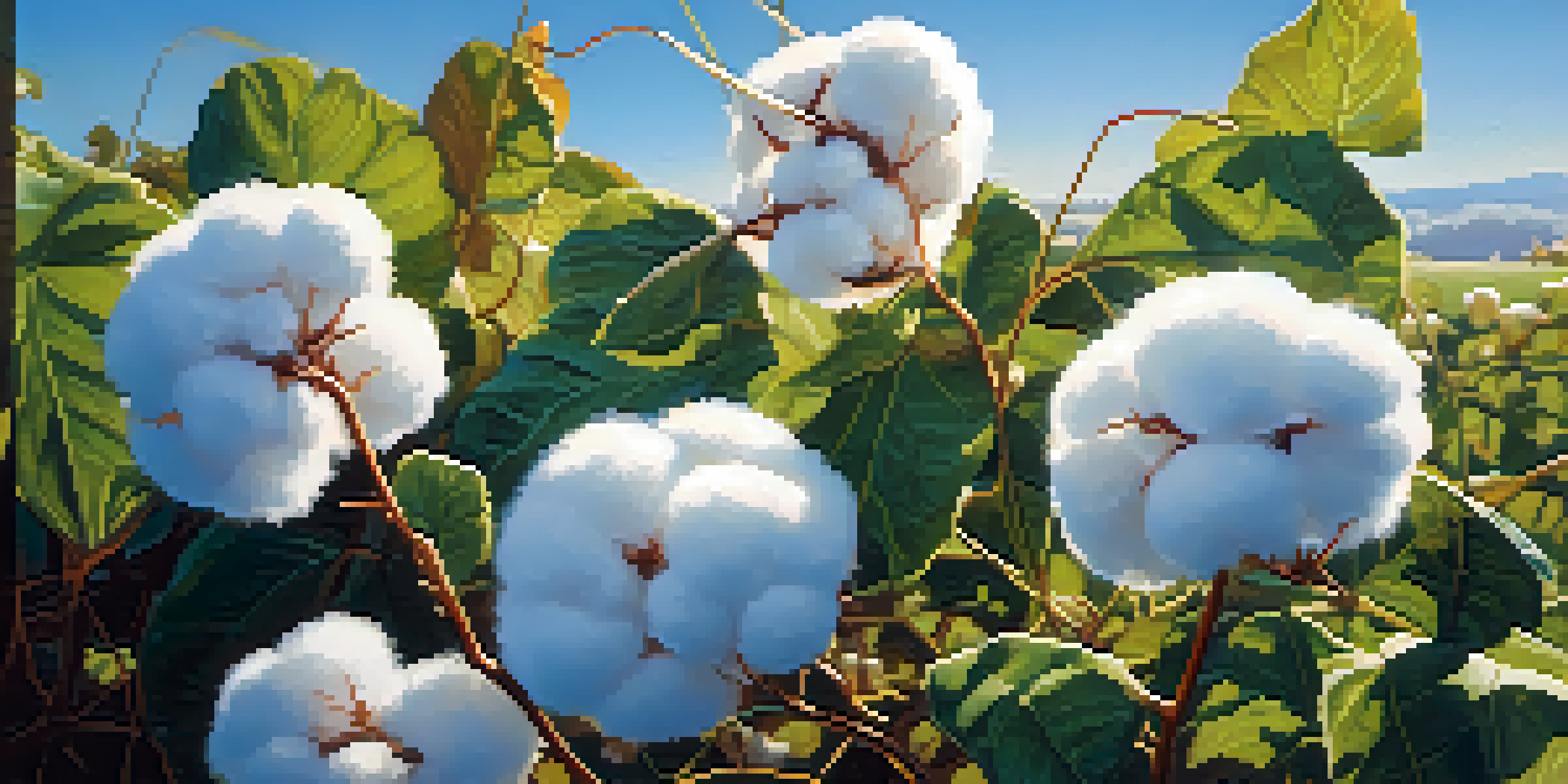Sustainable Fashion: The Rise of Organic Cotton Textiles

Understanding Sustainable Fashion in Today’s World
Sustainable fashion refers to clothing and accessories that are produced with minimal environmental impact and social responsibility. It's an approach that takes into account the entire lifecycle of a product, from raw material sourcing to disposal. As consumers become increasingly conscious of their purchases, brands are being urged to adopt more eco-friendly practices.
The fashion industry is at a crossroads, and it's up to us to decide which path to take. We can choose to be part of the solution, supporting sustainable practices that benefit both people and the planet.
One of the most significant movements within sustainable fashion is the shift towards organic materials. This transition is not just a trend; it’s a necessary step towards reducing pollution and conserving resources. By prioritizing sustainability, the fashion industry aims to create a positive impact on both the planet and its inhabitants.
Moreover, sustainable fashion encompasses various aspects, including ethical labor practices and reducing waste. As we delve deeper into this topic, it becomes clear that organic cotton textiles play a pivotal role in this evolving landscape.
What is Organic Cotton and Why Does It Matter?
Organic cotton is grown without synthetic fertilizers or pesticides, making it a healthier choice for the environment. Unlike conventional cotton farming, which can deplete soil and harm ecosystems, organic practices promote biodiversity and soil health. This sustainable farming method supports a healthier planet and protects the farmers who cultivate it.

Another vital aspect of organic cotton is its water usage. Organic cotton farms often implement rain-fed irrigation and sustainable farming techniques, significantly reducing water consumption compared to traditional methods. This conservation is essential, especially in regions where water scarcity is an ongoing issue.
Sustainable Fashion's Importance
Sustainable fashion prioritizes eco-friendly practices and ethical labor, responding to consumer demand for responsible choices.
By choosing organic cotton, consumers can contribute to a more sustainable future. This choice not only supports environmentally friendly practices but also encourages the fashion industry to innovate and shift toward more responsible sourcing methods.
The Benefits of Organic Cotton for the Environment
One of the most compelling benefits of organic cotton is its reduced environmental footprint. Organic farming methods use natural processes and materials, which minimizes pollution and conserves biodiversity. This contrasts sharply with the chemical-intensive practices of conventional cotton farming, which can be detrimental to the environment.
Sustainable fashion is not a trend; it’s a necessity for the health of our planet and future generations.
Additionally, organic cotton farming enhances soil health by maintaining its natural structure and nutrient balance. Healthy soil contributes to better crop yields and reduces the need for chemical fertilizers. This cycle of sustainability shows how organic cotton can positively influence agricultural practices worldwide.
Moreover, organic cotton production is often less energy-intensive, leading to lower greenhouse gas emissions. By supporting organic cotton, consumers can play a role in combating climate change and promoting a healthier planet for future generations.
How Organic Cotton Supports Ethical Labor Practices
Beyond environmental benefits, organic cotton farming often supports better labor practices. Many organic cotton producers are committed to fair trade principles, ensuring that farmers receive fair wages and work in safe conditions. This ethical focus helps create a more equitable fashion industry.
When consumers choose organic cotton products, they help promote these fair labor practices. This conscious choice empowers farmers and workers, fostering a sense of community and support. It’s a win-win situation where consumers can feel good about their purchases.
Benefits of Organic Cotton
Organic cotton reduces environmental impact, supports biodiversity, and promotes healthier farming practices.
Furthermore, many brands that utilize organic cotton often prioritize transparency in their supply chains. This transparency is essential for building trust between consumers and brands, encouraging a more ethical approach to fashion as a whole.
The Role of Brands in Promoting Organic Cotton
Brands play a crucial role in the rise of organic cotton textiles. By investing in sustainable sourcing and production practices, they can lead the charge towards a more eco-friendly fashion industry. Many companies are now adopting organic cotton as part of their core offerings, reflecting consumer demand for sustainable products.
Moreover, brands can also educate their customers about the benefits of organic cotton. By sharing stories about the farmers, the production process, and the environmental impact, they can inspire consumers to make informed choices. This narrative approach not only highlights the benefits of organic cotton but also fosters a deeper connection between the consumer and the product.
As more brands embrace organic cotton, they create a ripple effect that encourages others to follow suit. This collective effort amplifies the message of sustainability and helps reshape the fashion industry for the better.
Consumer Demand for Sustainable Fashion: A Driving Force
The growing awareness of environmental issues has led to a surge in consumer demand for sustainable fashion options. Shoppers are increasingly looking for products that align with their values, and organic cotton has become a popular choice. This shift in consumer behavior is prompting brands to rethink their strategies and prioritize sustainability.
Social media and digital platforms have played a pivotal role in amplifying this demand. Consumers now have access to information about the impact of their purchases and can easily share their preferences with others. This interconnectedness fosters a culture of sustainability that encourages brands to innovate and respond to consumer needs.
Consumer Power Drives Change
Growing consumer awareness and demand for sustainable options are pushing brands to adopt more eco-conscious strategies.
Ultimately, this consumer-driven movement towards sustainable fashion not only benefits the planet but also paves the way for a more ethical and responsible industry.
Future Trends: The Evolution of Organic Cotton Textiles
As the fashion industry continues to evolve, organic cotton textiles are likely to play an increasingly prominent role. Innovations in farming techniques, textile production, and product design are all contributing to the growth of this sustainable material. The future looks bright for organic cotton as brands and consumers alike embrace its many benefits.
Moreover, advancements in technology are making it easier for brands to incorporate organic cotton into their collections. From sustainable dyeing methods to eco-friendly packaging, the entire supply chain is being reimagined to prioritize sustainability. This evolution not only enhances the appeal of organic cotton but also sets new standards for the industry.

As we look ahead, the integration of organic cotton into mainstream fashion could become more commonplace. This shift would signify a collective movement towards sustainability and a commitment to protecting our planet for generations to come.